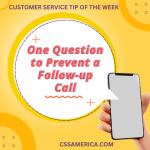I was recently facilitating a workshop on the customer experience, and I made the point that it’s usually beneficial to look at your personal life for great experiences; identify what really resonates with you in a positive way in order to uncover ideas to improve your own customer service.
So, I asked the participants: What companies are great at customer service? What organizations deliver an excellent customer experience?
There were a lot of the usual companies named such as Chick-fil-A, Disney, Trader Joe’s, and some local grocery store chains, as well.
Then the key question was asked: What makes them great?
Answers dealt with making a great first impression – with the greeting or the welcome. There were comments about the short wait times or at least the perception of short waits. They talked about how consistently high quality the service was, the people were, the experience was for the average customer. And they talked about predictability.
Predictability is not something often talked about during discussions of great customer service. There’s so much discussion in the customer service world about delighting customers, the Wow Experience (that surprisingly wonderful and unexpected experience), that we forget that most customers want some predictability.
They want to know that they’re going to be treated with respect. They want the process to be quick, simple, self-evident. And they want an experience that is consistent with examples of great service they’ve had in the past.
Predictability isn’t boring. However, it is difficult. That means that regardless of what employee or what process, your company has its own way of addressing the customer need, finding a solution, and having the most positive engagement possible.
The next time you’re looking for ways to improve, look at organizations that you consider to be great at customer service. Identify those actions they do consistently well, those things that are predictable. Then, find ways to make your engagement as consistent and positive as possible.
Engage like the titans of customer service – be predictably great!
Signup for FREE Tips! Contact Us More Resources for You Visit Our Home Page
























